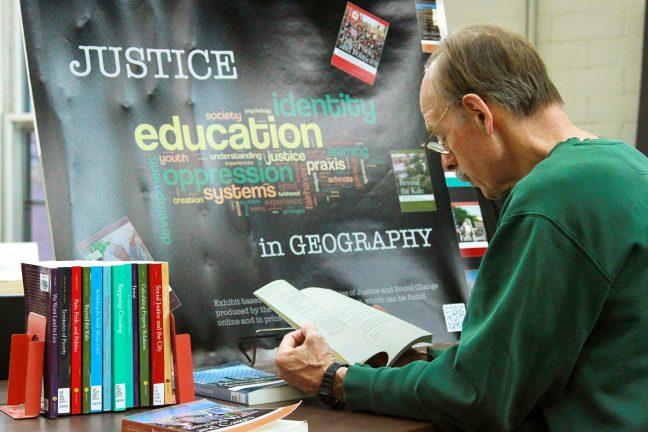University of Wisconsin Libraries held town hall meetings Thursday to hear public commentary from faculty and students about the Campus Libraries Facilities Master Plan.
The Campus Library Facilities Master Plan aims to create a more user-centered experience to support learning and collaboration spaces available for patrons.
Under the plan, nearly two dozen smaller libraries would be eliminated and the collection would be reduced by three quarters in volume, which the library system would incorporate into six central “hubs” for collections from smaller libraries around campus.
The plan would demolish much of Memorial Library and reorganize the collection into a larger space more accessible to the public. The plan also calls for the creation of a new South Library “hub” to include collections from Business, Merit and Social Work libraries.
The next on the list to go is the Geography Library Dec. 23. It will fully be transitioned out in August 2018.
The plan will be finalized and available in early 2018, following its acceptance by UW Facilities Planning & Management.
UW System faculty members, alumni feel voiceless in UW System decisions
Ed Van Gemert, Vice Provost for Libraries and University Librarian said the consolidation is about trying to organize a system that has materials scattered across campus and bring it into a centralized space for library patrons.
“The Master Plan is a vision of a path forward for a strong, centralized library system on this campus so we can better target our resources and our allocations to continue to provide top-notch services,” Van Gemert said.
UW Libraries houses the 11th largest research collection in North America with over 10 million reference materials in the collection, but the plan would significantly reduce that number to 25 percent of the current collection.
UW faculty and graduate students expressed concerns over their ability to quickly access materials when so many materials will be removed.
For academic scholars, especially within humanities subjects, accessing historical documents is a necessary part of research. Gloria Whiting, professor of history, said she was concerned to see severe reductions in the collections because her research is highly dependent upon her ability to access reference materials.
“I’m very concerned to see the real severe reductions to collections on site because it’s crucial to my research,” Whiting said. “Now to hear that [Memorial Library] is going to be demolished so that the money that was used to maintain that space can be put into research, for me is just very contradictory.”
Professors discuss political, social, public health implications of 2017 Go Big Read Book
Van Gemert said he doesn’t foresee accessibility to reference material being an issue, however. Only 25 percent of the collection has been in circulation in the past, meaning a majority of materials are not actively being used.
He plans to have all materials delivered within 48 hours of request. This follows the current model of interlibrary loan requests, and would help clear out older materials and create more usable space, Van Gemert said.
“If something hasn’t been used ever in the last 25 years, the likelihood if it being retrieved is next to zero,” Van Gemert said. “That’s not to say we won’t keep it … but it’s not likely that it’s going to be needed on active shelves today.”
But faculty members argued browsing physical material is valuable because they have the potential to find related documents they might not have otherwise seen.
Van Gemert said the reference materials would still be available to browse through digital catalogs, but Whiting said it does not offer the same benefits as a physical bookshelf.
“There is a scholarly value to browsing. I’ve always found things I’ve needed … from being able to physically go look at the books on the shelf and look in a way in which an electronic finding guide just doesn’t replicate that experience,” Whiting said.
‘Geography should not be destiny’: Forum explores rural challenges, solutions
UW Libraries has already moved to transition smaller libraries into information centers as part of the 2012 UW Libraries Campus Collections Plan. So far, the Chemistry, Business, Wendt Commons and Ruth Ketterer Harris libraries have already undergone renovations and a transition of reference material.


















